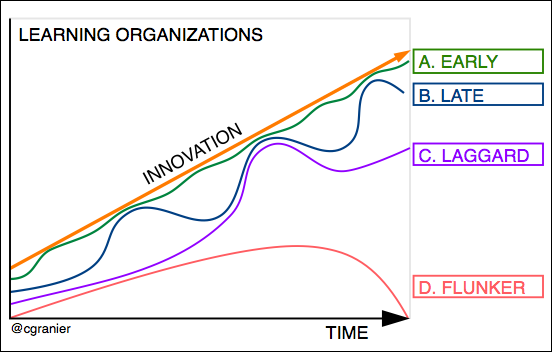In an age of constant innovation, it’s important to identify behaviors within your company that may hinder its chances of success.
Do you belong to a learning organization? Is anyone keeping up with innovations? Are employees encouraged to do so? When an employee comes up with a new idea, does that idea make it through the organization and reach the right people?
David Garvin and Amy Edmonson, authors of the HBR article on Learning Organizations, define a learning organization as one “skilled at creating, acquiring, interpreting, transferring and retaining knowledge” and capable of “modifying its behavior to respond to those new knowledges and insights.”
So, how does your company cope with innovation? I came up with the following chart to depict what I see as the four types of learning organizations:

Is your company an Early Adopter of innovative ideas? An Early Adopter is a company that innovates, stays up-to-date with new ideas and technologies that may impact its operations and has a system in place to reward innovation, experimentation and implementation throughout the enterprise.
A Late Adopter tries to stay up-to-date with innovation on a longer cycle. Late Adopters experiment with innovative ideas when they’re a bit more mainstream and tested. Being a Late Adopter is not necessarily a bad thing, as you can sometimes lose focus of your core business by over-innovating or following too many new ideas without ever integrating them to your operation.
A Laggard company is one that incorporates new ideas when strictly necessary. A Laggard won’t adopt a new technology until it’s vital for its continued survival. While this may work for certain niches with enormous barriers to entry, this behavior eventually catches up with them (or actually, their competition does).
Flunkers are simply blindsided by innovation. Not having any mechanisms in place to look at new ideas, or convinced that their idea is simply the best, they wake up one day to find that a competitor owns their market or that they’ve simply become obsolete.
Ray Stata, cofounder of Analog Devices, Inc once said that:
The rate at which organizations and individuals learn may well become the only competitive advantage.
In order to remain successful, individuals and organizations must learn faster than their competition in order to get ahead and stay ahead of the pack. If the rate of innovation in your particular industry is greater that your rate of learning, you’ll invariably fall behind.
Are you or your company geared for learning? Is someone in your company keeping you informed of new technologies that may affect you? Will you know what hit you?
Leave your comments… I’d love to take this conversation forward and refine some of the concepts presented in this article. Do you have a story to share about how innovation affected your company or life?
Additional info:
Technorati Tags: business-strategy, digital-media-strategy, information-overload, learning-organizations
About the Author
Carlos Granier is a Tech Founder, CTO, and AI Strategist with 25 years of experience building at the intersection of technology and business. He co-founded Pongalo, one of the first US Hispanic OTT platforms, and built a YouTube MCN to 200M+ monthly views. He now helps founders and executives implement AI as practical infrastructure. Based in Miami, Florida.
Let's Connect
If you want to hire me or get in touch about something or just to say hi, reach out on social media or send me an email.